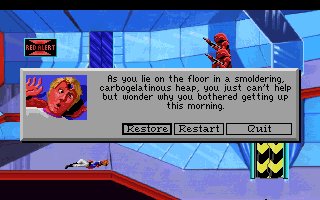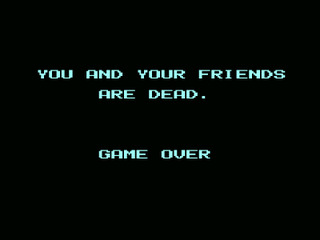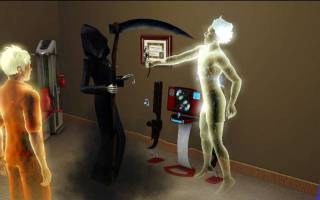The heart of the holiday season is a wonderful time of year: the Christmas lights are up, there’s a spirit of goodwill in the air, and the stores have finally cleaned up nearly all of the discarded blood and teeth remaining from Black Friday. It’s a magical time, one that makes you want to grab a mug of egg nog, curl up by a roaring fire, and write an unnecessarily morbid blog post.
It occurred to me the other day that if I had to choose a single concept or idea that most defined video games, it would be death. (A glass-half-full kind of person might say their major theme is “life” but it’s fair to assume that I tend to view my glasses as fairly empty.) Throughout most of their 40-year history, video games have been utterly consumed by the topic of death. It’s an obsession that continues to this day, and for someone like me who has played a lot of video games, I can’t help but believe the experience has affected the way I think about mortality.
Consider Pac-Man, an iconic arcade title virtually synonymous with video games. To a 1980’s adolescent, Pac-Man was more than a game; it was a spiritual experience. For a mere quarter, one could witness the birth of a hero, thrust into a brutal and uncaring world full of angry phantoms and energy pellets... and then, like an acne’d guardian angel, shepherd that hero through his transient existence to an imminent demise. It was an entire life, start-to-finish, in a box. Like real life, there was no escape, no bargaining, no loopholes... only survival. (Even the most talented angels among us—those who made no mistakes—would eventually reach the infamous split-screen level, and could proceed no further.) From the moment you touched that start button, Pac-Man was doomed.

While many classic games like Pac-Man reinforced the sentiment that death is inevitable, at least they allowed us a modicum of control over the timing of our passing. By contrast, there were a number of far less merciful games that taught us that death was savage and unpredictable, ready to descend upon us at any time and for any reason. Perfect examples of this sadistic mentality were Sierra games like those of the King’s Quest and Space Quest series. In the real world, leading causes of death are things like heart disease and vehicular accidents; in these games, leading causes of death included (but were not limited to) honeybees, playing alien slot machines, genies, buying bargain-priced robots and/or spaceships, prematurely eating custard pies, and ignoring trash cans. (Believe it or not, I did not make any of those examples up.)

Of course, as much as video games are about your own death, they’re also about other people’s deaths. Just as no man can make his proverbial omelette without sacrificing a few eggs, no plumber can rescue his princess without systematically murdering scores of anthropomorphized mushrooms. During my lifetime of gaming, however, there seems to have been a general philosophical shift in this regard. Games used to be about survival, or rescuing the princess, or defeating some sort of world-threatening evil. From a moral perspective, atrocities such as Link’s genocide of a entire species of rock-spitting octopuses were unfortunate but necessary consequences of the pursuit of these greater goals. (Plus, I needed the rupees.)

Now, though, many games are less about fundamental life-or-death struggles, and more about killing as many things as possible. Sure, Halo, Gears of War, or Call of Duty might pretend to have plots wherein some person, place, or thing has to be saved from some other person, place, or thing, but really the epic battle between these seemingly arbitrary nouns is simply a venue for bathing oneself in as much gore as possible. At least, I assume that’s the point, since I’m constantly being encouraged to “frag” enough people and get enough “killstreaks” during each “deathmatch” to maintain a respectable “kill/death ratio”, presumably so I can feel good about myself when I’m at home sitting on my throne made of infants’ skulls and drinking a chalice of baby seal blood.
I wonder how this shift is affecting the viewpoints of the next generation of gamers. To be honest, I worry they might be missing the point. Let’s say I’m playing an online and I witness a 12-year-old kid (with clearly absentee parents) brutally executing 20 people with a sniper rifle, only to throw a verbal hissyfit when the bell finally tolls for him in the form of a rocket launcher to the face. I want to say so many things to this kid, like “I’m sorry son... but it was just your time,” or, “hey, war is Hell,” or, “sometimes bad things happen to good Modern Warfare players.” But I’m afraid he just won’t get it, because unlike me, he didn’t have to grow up watching Pac-Man die.
So instead, I tell him, “Look, it could be worse... at least you’re not playing Space Quest.”

Log in to comment